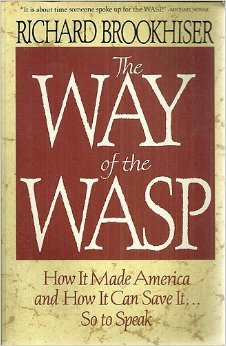The United States was founded by white Anglo-Saxon Protestants and became the political, economic, and military leader of the free world under their guidance. The conscience, industry, practicality, antisensualism, and sense of civic responsibility that characterizes the classic WASP became definably American characteristics. When immigrants entered the melting pot, they were to come out looking something like the WASPs who had invited them in.
Needless to say, something went wrong. It started with the WASPs themselves. At first, the revolt against (or transformation of) WASP values was thin-blooded—Henry Adams’s anomie, Emerson’s hyper-individualism, Woodrow Wilson’s progressivism. But by the 1960’s, 70’s, and 80’s, in Brookhiser’s words:
Defections from the general culture were occurring at a great rate. In each case the cause of flight, the bad past the defectors wanted to leave behind, as desperately as immigrants wanted to leave Odessa or Cork, was the world of the WASP. The enemy of every wayward impulse—of black pride, mother tongues, pot, frisbees, matriarchy, fisting, the Southern way of life, whatever—was conscience, industry, success, and all the rest: the way of the WASP.
The conscience that had been the driving moral force behind WASPs had—with a nice shove from Emerson—become solipsism. The industry, self-denial, and practical-mindedness of the WASP that led him inevitably to success (that allowed him to pursue, to a greater extent, his civic duty) has been altered beyond recognition. In the post-WASP world, where the self—the id—is central, creativity and self-expression become the thing, and the self turns its energies towards the goal of gratification. As we are all equal selves, we have no moral right to tell other selves how to live their lives (hence the unravelling of America into its composite victim groups, all of whom have developed their own political agendas to make sure that their rights and their share of government funding and affirmative action are maintained).
Needless to say, not all WASPs have succumbed, and even where they have, their virtues continue to appear—however distorted—in popular culture. As Brookhiser notes: “The puritanism of antisensuality often reappears, displaced into health and fitness. Robin Byrd, who hosts a popular pornographic show on cable TV, on which she interviews strippers and blue movie stars, also does a second show on which she demonstrates weightlifting. No doubt she is a nonsmoker.”
Brookhiser is remarkably sanguine about the future, in this brief book that closes before it outstays its welcome, but one wonders if he is not overly so. He thinks that Americans have realized that they took a wrong turn by experimenting with and-WASP values and are ready for a return to pro-WASP values. He even provides a mini-political platform for George Bush to adopt in the effort to bring back the way of the WASP. It includes a principled delimitation of the ends of government; the adoption of English-only laws; a return of education to the basics of reading, writing, and arithmetic; a comprehensive denial of the claims of special interest groups; and encouraging, as far as possible, a revival of Protestant, Victorian values. This movement must be Protestant because though the “Nation of Islam preaches this message [of industry and anti-sensualism . . . it] also preaches that nonblack races are the demonic results of a prehistoric breeding experiment on the island of Patmos . . . “
Brookhiser’s platform offers swell policies but not much in the way of tactical advice about how they could actually be implemented; and there seems very little likelihood that many of them will be. What this country needs is neither a two-cent cigar nor an old-style WASP like George Bush, but rather more vigorous Anglo-Saxons of the Wellington type who would look at AIDS marchers, teenage mothers, and daycare center agitators and growl: “Fornicate and be damned!” And who would say to all those seeking federal handouts because they are poor: “By God, so you are! Why don’t you do something about it!”
But somehow I don’t think that will happen.
[The Way of the WASP: How It Made America and How It Can Save It . . . So to Speak, by Richard Brookhiser (New York: The Free Press) 171 pp., $19.95]

Leave a Reply